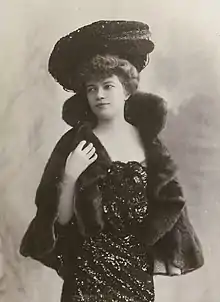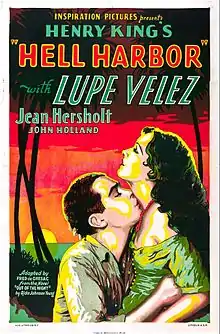Fred de Gresac
Fred de Gresac (died February 20, 1943), born Frédérique Rosine de Grésac, was a French librettist, playwright and screenwriter. She was the wife of opera singer Victor Maurel.

Early life
Frédérique Rosine de Grésac was born at Lamalou-les-Bains, in the south of France. (Dates of her birth range in sources, from 1866 to 1879.) She used the name "Fred de Gresac" professionally because, as she explained to a newspaper reporter, "I rather think the public likes its plays written by men."[1]
Career

In 1917, theatre critic Alan Dale wrote that "The most brilliant feminine playwright I have ever met is the lady who signs herself 'Fred de Gresac'."[2] She wrote more than 100 plays and screenplays, including The Marriage of Kitty (1903-1904), La Passerelle (Orange Blossoms) (1904, revived in 1922 as a musical and 1947; with Victor Herbert),[3] The Enchantress (1911-1912, with Harry B. Smith), The Wedding Trip (1911-1912, with Harry B. Smith and Reginald de Koven),[4][5] The Purple Road (1913), Sweethearts (1913-1914, with Harry B. Smith), and Flo-Flo (1917-1918, with Silvio Hein and E. Paulton).[6] Of the musical comedy Flo-Flo, she explained in 1919, "There is enough tragedy outside the theater. And so I have created Flo-Flo – I call her my spiritual cocktail – for America."[7]
Films written by de Gresac included The Marriage of Kitty (1915, now lost), The Kiss of Hate (1916, now lost), The Great Secret (1917, now lost), The Eternal Temptress (1917), La Bohème (1926), The Son of the Sheik (1926), Afraid to Love (1927), Camille (1926), Breakfast at Sunrise (1927), She Goes to War (1929), and Hell Harbor (1930).
In 1909 she was named artistic director of the Little Theatre in New York, offering "Elaborate and Costly Amusement in a Luxurious Setting for the Elect."[8]
Personal life
Fred de Gresac was married to opera singer Victor Maurel. She was widowed when he died in 1923. Fred de Gresac died in Los Angeles in 1943, probably in her eighties. Her papers are archived at Stanford University.[9]
References
- "Woman Playwright Says Public Prefers Men's Work" Indianapolis Star (January 21, 1912): 36. via Newspapers.com

- Alan Dale, "Women Playwrights: Their Contribution has Enriched the Stage" The Delineator (February 1917): 7.
- Orange Blossoms: A Comedy with Music in Three Acts (HARMS Inc. 1922).
- The Wedding Trip: An Opera Bouffe in Three Acts (Remick 1911).
- "'The Wedding Trip' Has Pretty Music" New York Times (December 26, 1911): 7.
- "'Flo-Flo' Comes to the Tremont" Boston Daily Globe (April 22, 1919): 5.
- "Flo Flo Opens at Grand Tomorrow" San Antonio Evening News (November 22, 1919): 8. via Newspapers.com

- "The 'Little Theatre'" New York Dramatic Mirror (July 10, 1909): 3.
- Mme. Fred de Gresac papers, ca. 1900-1945, Stanford University Libraries.
External links
- Fred De Gresac at the Internet Broadway Database
- Fred De Gresac at Playbill Vault
- The Online Books Page for Fred de Gresac.
- Fred De Gresac at the British Film Institute
- Three 1913 recordings of works by de Gresac, at the Dictionary of American Historical Recordings (DAHR), University of California Santa Barbara Library.